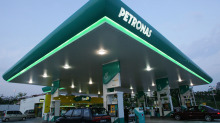Asian LNG giant eyes $5-billion Canadian acquisition
 Competition among foreign companies to buy Canadian natural gas assets is escalating, with a major global player announcing plans to spend billions of dollars on an acquisition as depressed prices punish domestic producers.
Competition among foreign companies to buy Canadian natural gas assets is escalating, with a major global player announcing plans to spend billions of dollars on an acquisition as depressed prices punish domestic producers.China’s three state-owned oil and gas companies dominate discussions when analysts and investors consider which outsiders might pay big dollars for energy projects in Canada. Companies from Japan, Thailand, South Korea, South Africa, and elsewhere usually come as an afterthought. But now Malaysia’s Petroliam Nasional Bhd., known as Petronas, has declared itself a serious player.
Asia’s powerful energy companies want to secure slices of Alberta and British Columbia’s massive natural gas resources as their populations expand and standards of living climb. Companies with properties in Canada, meanwhile, are desperate to find mates who have the financial firepower to help develop the projects as weak natural gas prices restrain spending budgets here. With a handful of proposed liquefied natural gas (LNG) export terminals in the early stages of engineering on British Columbia’s coast, rich players overseas are making noise about getting in on the action.
Petronas says it may announce a major deal within three months. It is exploring a $5-billion acquisition of a Canadian company, Bloomberg reported.
“This is going to be big,” Shamsul Azhar Abbas, Petronas’ chief executive officer, told the news agency in an interview in Kuala Lumpur. “There are quite a few candidates out there who are willing to talk.”
Potential buyers usually keep acquisition ambitions hushed in order to keep the stock price of their target stable and avoid increased competition when shopping. But at the same time, it is no secret Calgary’s hotels are continually playing host to foreign energy executives snooping around for partners. Petronas has been exploring options in the Canadian oil patch for one or two years.
Mr. Shamsul’s frank statement may have been trying to send the Canadian public, governments, and companies a message, observers note.
“This outlines there’s more than one player – [someone] other than the Chinese,” said one Calgary-based analyst, who asked not to be named.
Chris Lee, head of Deloitte LLP’s national energy and resource group, thinks Mr. Shamsul may be trying to prepare lawmakers for a sizable takeover. Many Canadians, including politicians, fret over foreign takeovers, arguing that the country is losing business clout and dealing away valuable resources.
“It sends a signal over to the federal government that there’s going to be more acquisitions,” Mr. Lee said. “This gives [Petronas] a way … to be exposed more to the general public and federal government.”
The federal government has supported foreign investment in Canada’s oil patch, including one deal where a Chinese company took over an entire company, and another where a Chinese player ended up with 100 per cent control over an oil sands project. A $5-billion deal from Petronas is likely not large enough for the federal government to blink, Mr. Lee said, noting that there are hundreds of energy companies in Western Canada.
Petronas struck a joint venture deal with Progress Energy Resources Corp. (PRQ-T11.000.211.95%)in June, and the Canadian company’s stock spiked about 8 per cent Monday after Mr. Shamsul’s comments. Progress is a major player in the Montney natural gas formation, and has LNG aspirations with Petronas. In order for Petronas to become a serious LNG exporter, it would need to produce trillions of cubic feet of natural gas, and Progress could provide that potential, the analyst said.
Progress in a statement on Monday said it “is not currently in discussions with Petronas regarding any business transactions outside of its joint venture relations.”
Petronas is a world leader in LNG technology and one of the largest shippers of the fuel globally, said Yuen Pau Woo, president of the vancouver-based Asia Pacific Foundation.
He said the Malaysian company is likely more interested in building a liquefaction plant and perhaps even pipelines, rather than producing gas assets.
Mr. Woo said the Chinese firms are more interested in oil properties and less involved with LNG, given the lack of natural gas infrastructure in the country. It is Japanese and South Korean firms, like Mitsubishi and Korean Gas Co., that are leading the Asian charge investing in West Coast gas facilities and the producing assets to back up long-term contracts. Encana Corp. recently sold 40 per cent of its undeveloped Cutbank Ridge property in northeastern B.C. to Mitsubishi for $2.9-billion.
You can return to the main Market News page, or press the Back button on your browser.

